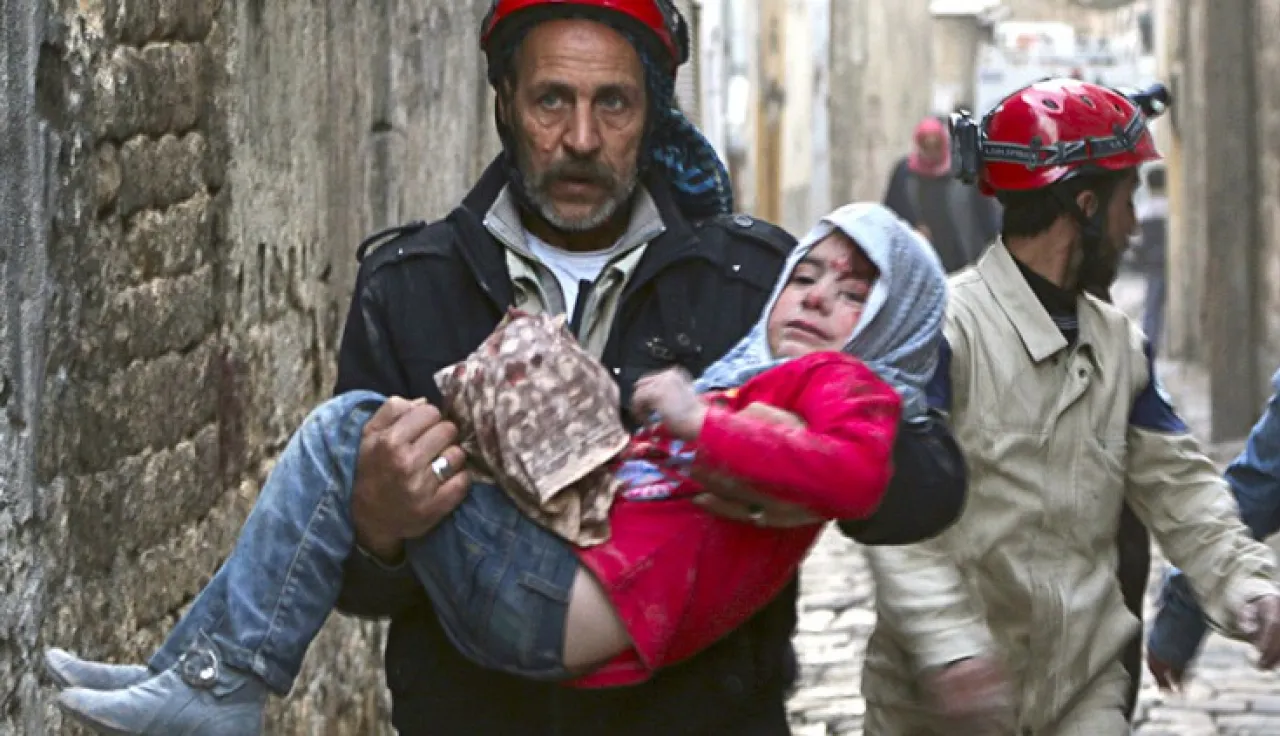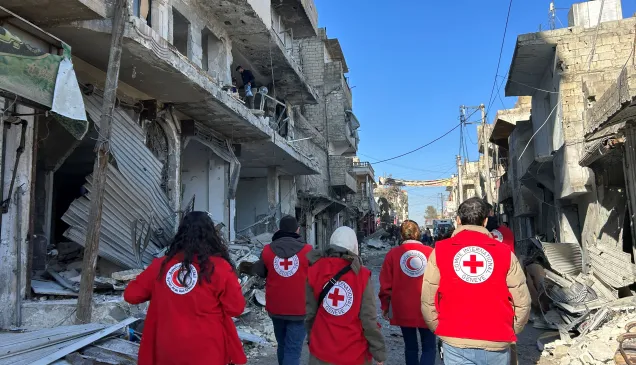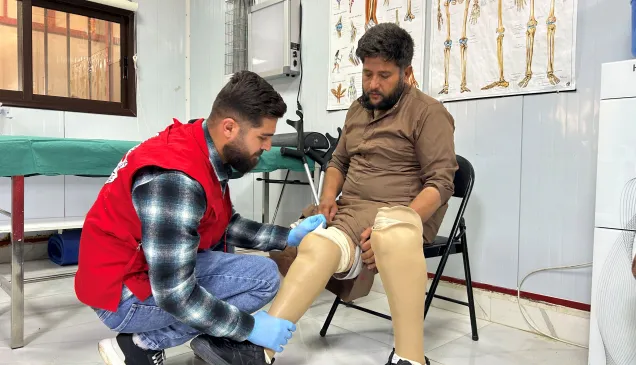In November, the ICRC provided clean water, food, health care and other emergency relief for more civilians than ever before, with joint ICRC-Syrian Arab Red Crescent teams repeatedly crossing front lines. Meanwhile, it has been pressing ahead with talks on humanitarian issues.
The armed conflict in Syria is continuing unabated and affecting millions of civilians across the country. In November, the ICRC provided food for 542,000 people, more than in any previous month. The organization also crossed front lines to provide clean water and health care to civilians in need. In addition, it continued to engage in dialogue with the various parties on urgent humanitarian issues, including during a Damascus visit by ICRC President Peter Maurer.
During his visit on 12-14 November, Mr Maurer discussed humanitarian priorities, including those relating to field access, with key Syrian officials, the leadership of the Syrian Arab Red Crescent, and others. The president also met with families displaced by the fighting, and visited the sites of activities carried out jointly by the ICRC and the Syrian Arab Red Crescent in government- and opposition-held areas of Barzeh, north of Damascus.
"No region or community in Syria is unaffected by the fighting," said Mr Maurer in Barzeh. "A lot of effort is going into processes of reconciliation. Nevertheless, needs are growing at a fast rate, making it imperative that we obtain access to more people everywhere in the country."
While in Damascus, Mr Maurer again called on all parties to meet their obligation under international humanitarian law to protect and spare civilians at all times and to facilitate the safe delivery of neutral, impartial, and independent humanitarian aid, including medical aid, to all people directly affected by the fighting.
In Barzeh, a Syrian Arab Red Crescent warehouse straddling a front line across the neighbourhoods of Esh Al Warwar and Al Balad was recently renovated by the ICRC to pre-position food and other essential aid. The Saadallah Wannous shelter, set up to accommodate displaced people, is now hosting civilians forced to flee their homes in eastern Ghouta. Meanwhile, the ICRC is upgrading and equipping Al Marabani clinic to enable it to soon provide health care for 400 patients a day. While the clinic is located in an opposition-held area of Barzeh, medical staff there will treat the sick and the injured regardless of their origins or political affiliations.
On 25 November, ICRC engineers and Syrian Arab Red Crescent volunteers delivered water purification supplies to the opposition-held areas of Al Rastan and Talbiseh in Homs. The delivery enabled the municipality to continue providing clean water for over 70,000 people. In another operation carried out across front lines, which took place on 1 November in the opposition-held Al Waer neighbourhood, also in Homs, ICRC and Syrian Arab Red Crescent health-care personnel delivered enough kidney dialysis supplies to treat over 700 patients.
Syria is the site of the ICRC's largest operation in terms of expenditure, with an annual budget of over 139 million Swiss francs. Over 285 ICRC staff members based in offices in Damascus, Aleppo, and Tartus work closely with the Syrian Arab Red Crescent throughout the country. The ICRC also helps Syrians who have had to flee to Jordan, Lebanon and Iraq because of the violence.
Facts and Figures – November 2014
Emergency aid
In November, the ICRC worked closely with the Syrian Arab Red Crescent to provide:
- food for over 542,000 people, most of them displaced by the fighting, in 10 governorates: Damascus, Rural Damascus, Sweida, Quneitra, Dara'a, Homs, Hama, Tartus, Lattakia and Idlib;
- daily meals in collective kitchens supported by the Syrian Arab Red Crescent for over 17,500 people living in temporary shelters in Rural Damascus, Homs and Lattakia;
- hygiene items, blankets, mattresses, towels, water buckets, rechargeable flashlights, candles, cooking sets and other essentials for nearly 150,000 people displaced by fighting;
- school supplies for almost 4,400 children displaced by fighting in Rural Damascus.
Water and sanitation
The ICRC worked closely with the Syrian Arab Red Crescent to upgrade water facilities in:
- a shelter in Rural Damascus accommodating over 400 displaced people;
- a shelter in Aleppo city housing over 200 displaced people;
- two shelters in Homs housing over 265 displaced people.
The two organizations provided water-purification supplies for use in water-treatment plants in Deir Ezzor, Raqqa, Al-Hassakeh, Aleppo and Al-Sweida governorates.
In addition, the ICRC and the Syrian Arab Red Crescent:
- delivered water by truck to over 100,000 displaced people currently living in Moadamiya, Deir Ezzor, Al Dweir camp, Arrastan city, Homs city, Al Nabek and Tal Kurdi;
- provided supplies for water testing and analysis to Al Mazraa pumping station in Damascus;
- provided equipment to protect pumps and motors in Suleiman Al-Halabi station, the main water-pumping station in Aleppo;
- carried out maintenance work on generators in Tal Shanaan, Nawa Al Shoukatlieh, Oum Makhoul and Soukkara in rural Homs;
- repaired water-network equipment in Tal Refaat, Nubol, Anadan, Enjarah and Atareb in rural Aleppo;
- distributed 20,000 bottles of water to people fleeing the fighting in Dara'a city.
Health
The ICRC worked closely with the Syrian Arab Red Crescent to provide:
- supplies and financial support for nine Syrian Arab Red Crescent mobile health clinics and one outpatient care facility in Rural Damascus, Aleppo, Idlib, Hama, Homs, Deir Ezzor and Tartus, which together have the capacity to provide primary health care for over 7,000 patients every month;
- first-aid training courses for over 90 volunteers from the Damascus, Homs, Tartus and Deir Ezzor branches of the Syrian Arab Red Crescent;
- enough supplies for 700 haemodialysis sessions to Al Bir Hospital in the opposition-held Al Waer quarter of Homs;
- an electric generator to the Palestine Red Crescent Society outpatient care facility in Al Nairab camp in Aleppo;
- an electric generator to Ansert Hospital in Urem, Aleppo.
Restoring contact between family members separated by the conflict
The ICRC delegation in Damascus:
- issued nine travel documents for Palestinians and facilitated their transfer through Lebanon for resettlement in another country;
- received 201 tracing requests from people seeking to locate their relatives;
- distributed one Red Cross message (containing family news) and 14 salamats (oral messages to family members), mainly from Syrians abroad;
- organized a round table for 25 Ministry of Health forensic practitioners from across Syria.
For further information, please contact:
Umar Phiri, ICRC Damascus, +963 991 186 694
Dibeh Fakhr, ICRC Geneva, tel: +41 22 730 37 23 or +41 79 447 37 26




